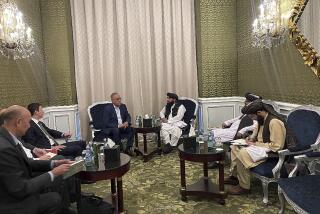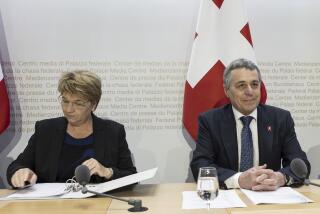Members of New Iraqi Council Will Address the U.N.
- Share via
UNITED NATIONS — Three members of Iraq’s new governing body will address the U.N. Security Council next week as individual experts and not as representatives of an official government, the Security Council decided Thursday.
The delegates will speak Tuesday after the Security Council is briefed by the U.N.’s special representative to Iraq, Sergio Vieira de Mello, on the world body’s role in rebuilding Iraq.
Spain’s ambassador to the U.N., Inocencio Arias, the current council president, said members decided during closed-door consultations that the three delegates could speak under Article 39 of the council rules, which allows anyone the council considers competent to provide information.
“They will be invited not as an official government but as individuals,” Arias said Thursday.
The Iraqi delegation will include Ahmad Chalabi, leader of the Iraqi National Congress, a former exile group; Adnan Pachachi, an 80-year-old Sunni Muslim who served as foreign minister before the Baath Party came to power in 1968; and Aqila Hashimi, a Shiite Muslim and diplomat who led Iraq’s delegation to last month’s U.N.-sponsored conference on rebuilding Iraq, a U.N. spokeswoman said.
The 25-member governing council of prominent Iraqis was created Sunday with U.S. backing. It is the first national body since the fall of Saddam Hussein.
The council will have the power to appoint interim ministers, help draft the national budget and set broad national policy. But final control of Iraq still rests with L. Paul Bremer III, the U.S. administrator of Iraq.
The council voted Monday to send the delegation to the U.N. to assert itself as a “legitimate Iraqi body during this transitional period.”
Some council diplomats were concerned that the delegation might try to take Iraq’s seat at the U.N., which probably would spark opposition because the United States and Britain remain as occupying powers and there still is no elected representative government in Iraq.
Iraq’s U.N. seat remains with diplomats who served under Hussein’s regime. Ever since Mohammed Douri, Hussein’s envoy to the U.N., left New York in April, Iraqi diplomats have kept a low profile. Iraq’s U.N. mission remains open, with the former third-ranking diplomat, Said Shihab Ahmad, in charge.
More to Read
Sign up for Essential California
The most important California stories and recommendations in your inbox every morning.
You may occasionally receive promotional content from the Los Angeles Times.













